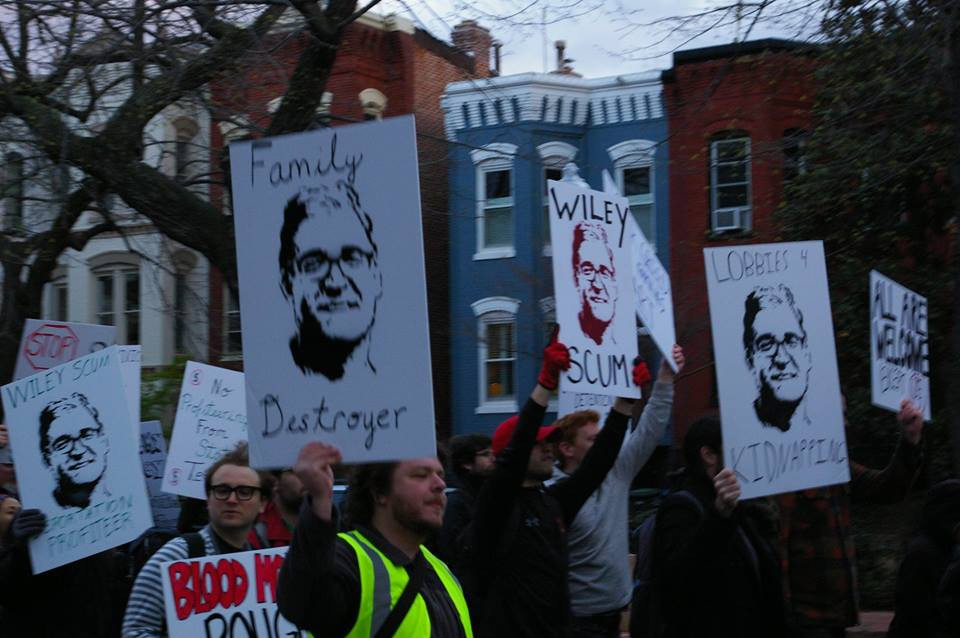
The Activist Left Doesn’t Give a Shit About Your Calls for Civility
June 25, 2018Every day, America seems to get a little angrier. Wander over to Twitter just for a second and you can feel the anger wash over you the same way you feel the humidity when you go outside on a particularly brutal summer day. But the anger is there in real life, too. It follows Donald Trump wherever he goes: Last Tuesday, a congressional intern apparently shouted, “Mr. President, fuck you!” as he walked by.
It increasingly seems to follow Trump subordinates as well. White House adviser Stephen Miller, one of the architects of the administration’s infamous family separation policy, was recently called a “fascist” by a fellow customer at a DC Mexican restaurant. A couple nights later, Homeland Security Secretary Kirstjen Nielsen was driven out of another Mexican spot by a chorus of “Shame! Shame!” from protesters. Trump administration officials may want to look into Blue Apron—on Friday, White House spokesperson Sarah Sanders was denied service at a Virginia eatery. (Trump supporters subsequently started harassing a similarly-named restaurant in DC.)
This new escalation in hostility—the continuation of a sharp trend toward political polarization in recent decades—has alarmed America's pundit class. "Now we’re divided by red plates & blue plates! #sad," tweeted former Barack Obama adviser David Axelrod. The conservative USA Today columnist James S. Robbins called on Democrats to "try raising the bar." The Washington Post editorial board wondered at where all this would lead: "How hard is it to imagine, for example, people who strongly believe that abortion is murder deciding that judges or other officials who protect abortion rights should not be able to live peaceably with their families?"
It is easy to imagine that, actually, given that anti-abortion activists routinely protest at clinics and harass women getting abortions, while some extremists have killed doctors. But more broadly, objections to the sort of rage-infused, aggressive tactics now advocated by some on the left and the right are far too little, far too late. The people on the left who embrace these tactics aren't going to be persuaded by calls for civility: They see these as desperate times calling for desperate measures. Perhaps more importantly, they see these desperate measures as effective.
Austin Kendall was one of the DC Democratic Socialists of America members who gathered to jeer Nielsen on Tuesday. He told me over the phone that it was a spontaneous action thrown together quickly over a group text he and fellow activists use for rapid organizing, but his DSA chapter has organized several similar protests against individuals far more deliberately, even if they didn’t make the national news. These protests, all of which happened this year, he said, consisted of more than 60 people gathering outside the homes of those they saw as profiting off of the unjust detention of immigrants. One April protest against Jeremy Wiley, a lobbyist for private prison company CoreCivic, featured activists wielding signs with his face and text like “Wiley Scum” and “Family Destroyer.”
"The idea is to expose to their neighbors the sort of person that they are," Kendall told me. "We think the neighbors don't always realize these are people who make a profit off of destroying immigrants' lives."
DSA is on the bleeding left-wing edge of progressive movement politics ("We're socialists, not liberals," Kendall told me), but there are signs that those sorts of actions are becoming more mainstream. "If you see anyone from [Trump's] cabinet in a restaurant, in a department store, at a gasoline station, you get out and you create a crowd and you push back on them and you tell them they’re not welcome!" California Congresswoman Maxine Waters told an enthusiastic crowd over the weekend. Her remarks were denounced by Democratic House Leader Nancy Pelosi, and Waters is not exactly a power player on the Hill. But it seems clear that many progressives agree with her—and are ready and waiting should Trump officials show up at their local 7-Eleven for a bag of jerky.
David Klion, a left-wing freelance journalist, told me that part of the reason for this recent tactical escalation on the left's part may have to do with a sense of futility many feel. Ordinary denunciations of Trumpism, including "stern editorials from the New York Times" and "'have you no decency sir' moments on TV” haven’t accomplished anything, Klion said, so more drastic action is justified.
"I've had a few letter-writing events where we get postcards and write them to a wavering member of Congress on healthcare or something like that," he said. "It’s an affirming and communal thing to do, but there's a sense of impotence to it as well. They're just going to set these letters on fire, they don’t care, they only care about their donors.”

Expressing anger in visceral ways is an old pastime—President Herbert Hoover was jeered and assaulted with rotten vegetables and eggs on the 1932 campaign trail, for instance. Public shaming is also popular well beyond America's borders, with numerous people attempting to make "citizen's arrests" of former UK Prime Minister Tony Blair for his role in the Iraq War. But the internet—and an era of renewed vitriol in the public square—has opened new possibilities for those wishing to make life harder for their political enemies. Last week, a programmer scraped publicly available LinkedIn data to create a list of ICE employees, and though sites like Medium and GitHub quickly took that database down, Wikileaks published what appeared to be the same info just as quickly.
Perhaps even more controversially, last Wednesday Splinter released what it said was Stephen Miller’s cell phone number. Twitter responded by suspending the accounts of both the news organization and people who shared the article, including Klion, on the grounds that the platform prohibits the release of personal information. Splinter's was an unusual move, even by the standards of oppositional journalism, but Klion defended it on the grounds that "Stephen Miller is a powerful person, and power differentials matter." In other words, this was not the "doxxing" of a vulnerable private citizen, but someone who was doing real harm to the country.
Splinter did not respond to a request for comment, but in its initial article noted that Trump himself has "published the cell phone numbers of both his Republican primary opponent Lindsey Graham and Univision anchor Jorge Ramos." In 2016, Trump called out union organizer Chuck Jones by name; the man subsequently received death threats. Trump has also egged on crowds at his rallies to act violently against protesters. If the president is one of the people refusing to uphold the norms of civil discourse, one could argue, those norms are already dead, buried, and decaying into carbon.
Yet another justification for confronting administration officials in public is that the administration’s hardline policies might actually justify it. "Some people will say we're being uncivil, they'll call what we did violence, but literally nothing we did was violence," Kendall told me. "The only violence that we're seeing is from the Trump administration separating families."
Both Kendall and Klion emphasized that even the most aggressive actions against administration officials have been nonviolent and entirely legal. Kendall told me that the police observed but didn't interfere with the protests against prison lobbyists, adding that his group wasn't interested in being hostile to ordinary Republican voters. "We're not going after people who aren't in power,” he told me. "We are only interested in challenging power." (Not everyone is down with this philosophy—a New York bar has become famous for not serving Trump supporters.)
And though DC denizens nostalgic for a simpler time might condemn public heckling and other attempts to make life miserable for Trump administration officials, there’s evidence it is having the desired effect. The latest issue of Politico Magazine featured a story documenting how hard it was for young administration aides to date and socialize in liberal DC. That, Kendall told me, "definitely is the atmosphere we are trying to create…. Several of the people in the article are said to be former administration employees, suggesting the social pressures were so intense that they left." In his view, if social isolation creates turnover in the administration, that makes it harder for Trump’s objectives to be fulfilled.
The politics of rage has clearly worked out pretty well for Trump. Almost as clearly, such tactics are paying some kind of dividends for the opposition. The pundits may be correct that the increasingly combative nature of political debates will ultimately be bad for the country. All the same, it doesn't seem likely that anyone is going to turn down the volume.
Follow Harry Cheadle on Twitter.


